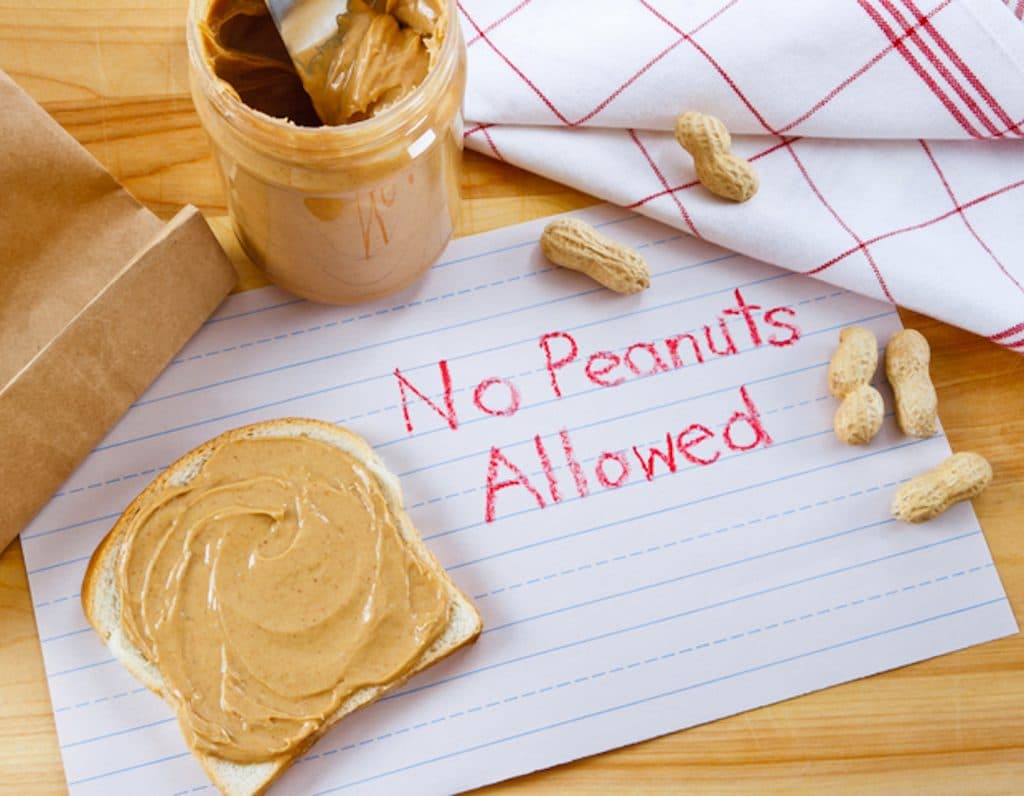
 Post Category - Health & WellnessHealth & Wellness - Post Category - WellnessWellness - Post Category - NutritionNutrition
Post Category - Health & WellnessHealth & Wellness - Post Category - WellnessWellness - Post Category - NutritionNutritionPeanut prep…
As parents, we naturally want know what to feed our baby when he or she is ready for solid foods. As one of the nine common allergenic foods, peanuts often come up in the frequently asked questions I get from parents. Particularly since so many children today are living with a peanut allergy, and so many schools have adopted a peanut-free (and sometimes a nut-free) environment. Read on to get the latest guidelines of introducing peanuts to your child, the advantages and the risks of introducing peanuts early, and the sources of peanuts in food and non-food items.
Should I introduce peanuts to my baby early?
Earlier in 2017, the National Institute of Allergy and Infectious Diseases (NIAID) in the United States published revised guidelines for the prevention of peanut allergy. In summary, the guidelines recommend that introducing peanuts as early as four months of age may reduce the risk of peanut allergy. When to introduce peanuts to babies, however, is dependent on a few factors, such as whether the infants have eczema and/or egg allergy. The NIAID established three guidelines for when to introduce peanut-containing foods to infants:
- infants with severe eczema and/or egg allergy are considered for high risk for peanut allergy, and are recommended to be introduced to peanut-containing foods as early as four to six months
- infants with mild to moderate eczema are considered for low to moderate risk for peanut allergy, and are recommended to be introduced to peanut-containing foods around six months
- infants without eczema or any food allergy are considered for low risk for peanut allergy, and are recommended to be introduced to peanuts along with other solid foods according to family preferences and cultural practices

Advantages of introducing peanuts early
NIAID suggests that introducing peanuts as early as four months of age for those who have eczema and/or egg allergy under medical supervision may reduce the risk of peanut allergy later in life. However, a high risk infant is recommended to be clinically tested before introducing peanuts in his or her diet. Based on the tests results, the doctor will determine the quantity and the texture of peanuts to be introduced to the baby.
Risks of introducing peanuts early
While the revised guidelines demonstrate the advantages of introducing peanuts early, there are also risks involved. First, infants at four months of age are generally not developmentally ready for solid foods as they may not be able to fully sit up and lean forward, and may not have developed good head control. Second, whole peanuts, peanut chunks and peanut butter are choking hazards for infants. Therefore, introducing age-appropriate peanuts to babies after they have been introduced to other solids foods is recommended.
My thoughts on the NIAID recommendations
The recommendations from NIAID were based on the results from the Learning Early About Peanut (LEAP) trial, where it compared the onset and the risk of peanut allergy amongst infants who were introduced to peanuts between four and eleven months and children who were first introduced to peanuts at five years of age. As mentioned in my Food Allergies 101 article, delaying the introduction of common allergenic foods will not reduce your baby’s risk in having a food allergy. At the same time, providing solid foods to infants as early as four months of age also poses the risk of choking.
Before six months of age, breastmilk (or infant formula if your baby is not breastfed) is the best source of food for baby’s growth. Since the risks outweigh the benefits, I would recommend introducing texture-appropriate peanuts when your baby is at least six months of age along with other first foods such as iron fortified cereals, vegetables and fruits and common allergenic foods such as fish, wheat, whole eggs, soy and milk products. However, if you are concerned that he or she may be at a higher risk for peanut allergy due to the presence of eczema and/or due to the family history of food allergies, hay fever and asthma, you may wish to speak with your baby’s healthcare provider and explore the options available before introducing peanuts at home.
Furthermore, the NIAID guidelines only applies to infants who have not been introduced to peanuts or experienced any reactions to peanuts. If your baby is already eating peanut-containing foods on a regular basis and has not displayed any symptoms, such as hives, itchiness, and difficulty breathing, he or she is not allergic to peanuts, and therefore does not require any medical attention and allergy testing.

Which type of food products can you find peanuts?
Peanuts can be listed in other names and can be found in a variety of food products. While the following is not an exhaustive list, it will give you a general idea of where you can find peanuts. Always read the ingredients list and the food packaging to ensure the product is peanut-free before offering the food to your child who is allergic to peanuts. When eating out with your child, you may also want to notify your server that your child is allergic to peanuts and inquire about whether the menu item you wish to order is peanut-free.
Other names for peanuts or nuts
arachide = ground nuts
arachis oil = kernels
beer nuts mandelonas, nu-nuts
cacahouete/cacahouette/cacahuete = nut meats
goober nuts, goober peas = valencias
Products that may contain peanuts…
Almond and hazelnut pastes, marzipan, baked goods, dried salad dressings, nougat, cake icing, egg rolls, pastries, candy, fried foods, peanut popcorn, cereals, potato chips (may be made with peanut oil), chili con carne (peanut butter may be used to thicken chili), dehydrated soup mixes, Chinese food, Thai food, granola bars, energy bars, fruit bars, satay sauce, chocolate bars hydrolyzed vegetable protein, hydrolyzed plant protein, commercial desserts, vegetarian meat substitutes.
There are also non-food sources that may contain peanuts. If your child has a peanut allergy, do read the information on the packaging and labels before purchasing and having them available in your home. The list includes:
Ant baits, bird feed, mouse traps, pet food, Stuffing in toys, Craft materials, Some types of sunscreen lotion and lip glosses, Some types of vitamin supplements, skin creams and cosmetics.
All in all, a peanut allergy is a complex issue but if it is caught early, it can be managed. Do speak with your child’s healthcare provider if you have any further questions.
 View All
View All











 View All
View All




 View All
View All


 View All
View All











